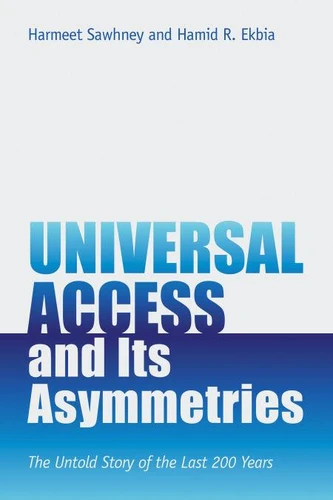Universal Access and Its Asymmetries. The Untold Story of the Last 200 Years
Par : ,Formats :
Disponible dans votre compte client Decitre ou Furet du Nord dès validation de votre commande. Le format ePub protégé est :
- Compatible avec une lecture sur My Vivlio (smartphone, tablette, ordinateur)
- Compatible avec une lecture sur liseuses Vivlio
- Pour les liseuses autres que Vivlio, vous devez utiliser le logiciel Adobe Digital Edition. Non compatible avec la lecture sur les liseuses Kindle, Remarkable et Sony
- Non compatible avec un achat hors France métropolitaine
 , qui est-ce ?
, qui est-ce ?Notre partenaire de plateforme de lecture numérique où vous retrouverez l'ensemble de vos ebooks gratuitement
Pour en savoir plus sur nos ebooks, consultez notre aide en ligne ici
- Nombre de pages244
- FormatePub
- ISBN978-0-262-37297-8
- EAN9780262372978
- Date de parution13/12/2022
- Protection num.Adobe DRM
- Taille619 Ko
- Infos supplémentairesepub
- ÉditeurThe MIT Press
Résumé
A framework for understanding the totality of costs and benefits of universal access that will foster honest appraisal and guide the development of good policies. Universal access-the idea that certain technologies and services should be extended to all regardless of geography or ability to pay-evokes ideals of democracy and equality that must be reconciled with the realities on the ground. The COVID-19 pandemic raised awareness of the need for access to high-speed internet service in the United States, but this is just the latest in a long history of debates about what should be made available and to whom.
Rural mail delivery, electrification, telephone service, public schooling, and library access each raised the same questions as today's debates about health care and broadband. What types of services should be universally available? Who benefits from extending these services? And who bears the cost? Stepping beyond humanitarian arguments to conduct a clear-eyed, diagnostic analysis, this book offers some surprising conclusions.
While the conventional approach to universal access looks primarily at the costs to the system and the benefits to individuals, Harmeet Sawhney and Hamid Ekbia provide a holistic perspective that also accounts for costs to individuals and benefits for systems. With a comparative approach across multiple cases, Universal Access and Its Asymmetries is an essential exploration of the history, costs, and benefits of providing universal access to technologies and services.
With a fresh perspective, it overturns common assumptions and offers a foundation for making decisions about how to extend service-and how to pay for it.
Rural mail delivery, electrification, telephone service, public schooling, and library access each raised the same questions as today's debates about health care and broadband. What types of services should be universally available? Who benefits from extending these services? And who bears the cost? Stepping beyond humanitarian arguments to conduct a clear-eyed, diagnostic analysis, this book offers some surprising conclusions.
While the conventional approach to universal access looks primarily at the costs to the system and the benefits to individuals, Harmeet Sawhney and Hamid Ekbia provide a holistic perspective that also accounts for costs to individuals and benefits for systems. With a comparative approach across multiple cases, Universal Access and Its Asymmetries is an essential exploration of the history, costs, and benefits of providing universal access to technologies and services.
With a fresh perspective, it overturns common assumptions and offers a foundation for making decisions about how to extend service-and how to pay for it.
A framework for understanding the totality of costs and benefits of universal access that will foster honest appraisal and guide the development of good policies. Universal access-the idea that certain technologies and services should be extended to all regardless of geography or ability to pay-evokes ideals of democracy and equality that must be reconciled with the realities on the ground. The COVID-19 pandemic raised awareness of the need for access to high-speed internet service in the United States, but this is just the latest in a long history of debates about what should be made available and to whom.
Rural mail delivery, electrification, telephone service, public schooling, and library access each raised the same questions as today's debates about health care and broadband. What types of services should be universally available? Who benefits from extending these services? And who bears the cost? Stepping beyond humanitarian arguments to conduct a clear-eyed, diagnostic analysis, this book offers some surprising conclusions.
While the conventional approach to universal access looks primarily at the costs to the system and the benefits to individuals, Harmeet Sawhney and Hamid Ekbia provide a holistic perspective that also accounts for costs to individuals and benefits for systems. With a comparative approach across multiple cases, Universal Access and Its Asymmetries is an essential exploration of the history, costs, and benefits of providing universal access to technologies and services.
With a fresh perspective, it overturns common assumptions and offers a foundation for making decisions about how to extend service-and how to pay for it.
Rural mail delivery, electrification, telephone service, public schooling, and library access each raised the same questions as today's debates about health care and broadband. What types of services should be universally available? Who benefits from extending these services? And who bears the cost? Stepping beyond humanitarian arguments to conduct a clear-eyed, diagnostic analysis, this book offers some surprising conclusions.
While the conventional approach to universal access looks primarily at the costs to the system and the benefits to individuals, Harmeet Sawhney and Hamid Ekbia provide a holistic perspective that also accounts for costs to individuals and benefits for systems. With a comparative approach across multiple cases, Universal Access and Its Asymmetries is an essential exploration of the history, costs, and benefits of providing universal access to technologies and services.
With a fresh perspective, it overturns common assumptions and offers a foundation for making decisions about how to extend service-and how to pay for it.



